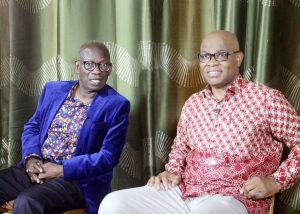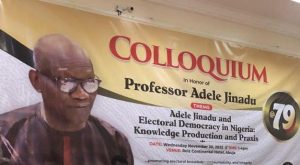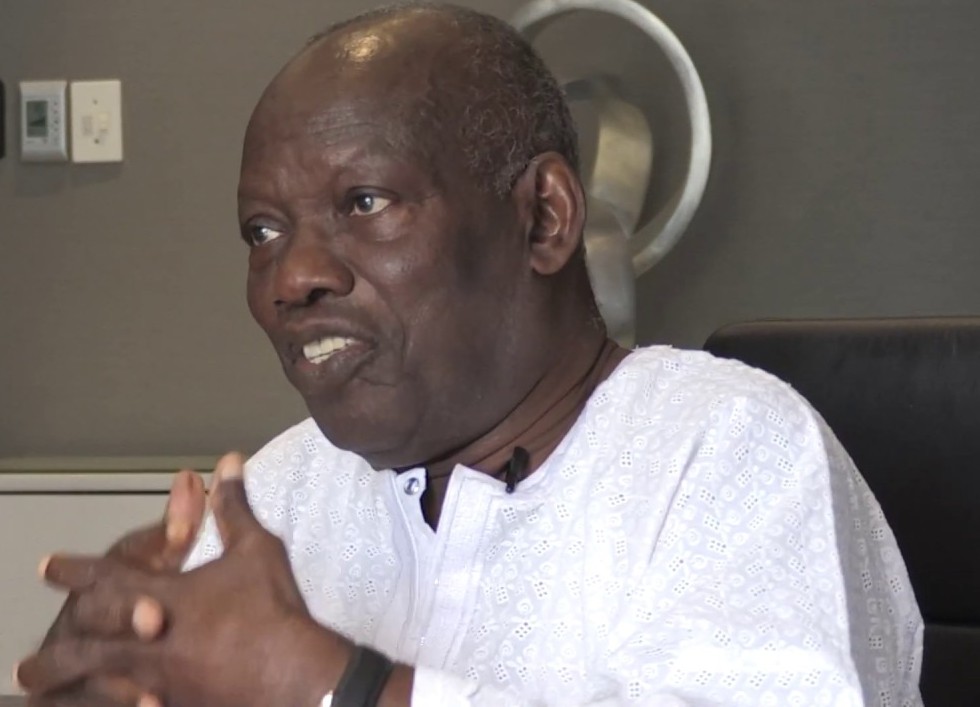By Prof. Hassan A. Saliu
There are scholars and their areas of strength, weakness and ultimately, their trademarks. Some are policy oriented in their engagement and have therefore made their impacts on policy terrain. Others derive their recognition from their strong publication profiles or supervision records. Advocacy and activism, culminating in being public intellectuals through regular appearances in the media and other public fora are the defining features of some others. I also note that there are born teachers who showcase such teaching talents in the classrooms. There are definitely other categories of scholars that are available in the University system. Prof. Liasu Adele Jinadu , LAJ, is one of the few scholars that are difficult to pin down to any of these categorisations of scholars based on their defining attributes as their engagements have spanned several years and are characterised by immense contributions on all fronts.
I first met Prof. Jinadu in 2003 in Zaria at the conference of NPSA where an election was scheduled to take place to elect another exco after five years of lull in the activities of NPSA. This was contrary to our expectation at Ibadan where the exco was constituted in 1998, after the remarkable Ibadan drama that reflected in the famous statement made by its then Head of Department, late Dr. Kunle Amuwo. During the business session and at the point of announcing the UI slate, he had said that: “Prof. Oyeleye Oyediran (late) who had aspired to be the president of NPSA was a staff of University of Lagos, UNILAG, but he was sufficiently around in University of Ibadan, UI.” The import of the statement made by the HoD was that UI, being the host institution, had no valid slate in the tradition of our Association. It was the announcement that eventually paved the way for the emergence of the Dr. Paul Izah-led exco. Also worth noting was the state of our Association that immediately preceded the coming into office of then Dr. Izah as President. The NPSA was virtually thrown into confusion with the unceremonious exit out of the country of Prof. Leo Dare, who had been elected as President at the Ife conference of 1994 shortly afterwards. It was Dr. Ogban Ogban Iyam, his Vice-President, who, for almost four years, held forth as the Acting President and completed the term of the exco. Given these trajectories, the Zaria conference was pregnant with meanings and significant in its eventual outcome.

At a function in Abuja a few years back!
At the conference in Zaria, and more at a personal level, everything was being done for me to be elected as the president of NPSA until an unfriendly breeze blew in from Lagos that threw spanners into my preparations. Two of our colleagues from Lagos, who incidentally were my friends, changed all the arrangements on ground for my coronation by talking to a senior colleague to come into the race. When that was not feasible, Prof. Jinadu was then invited to contest for the presidency of NPSA. Needless to say that I effortlessly dropped my ambition for a man who my supervisor also calls his Oga. I was made the Chairman of the Communique Drafting Committee ostensibly as a compensation. I, however, nominated a member of the exco from Ilorin in 2003. For the records, our friends from Lagos State University, LASU, had played up some issues and the roles I played in them with the ultimate aim of preventing me from mounting the presidency of our Association in Zaria.
Prof. Jinadu who turns 80 in a few weeks’ time is a scholar and public intellectual who has transversed all the known specializations in Political Science and has had a stint of government and research appointments such as being a NEC Commissioner, DG of the Administrative Staff College of Nigeria, ASCON, Badagry, Director, Centre for Advanced Social Sciences, CASS, PortHarcourt, among others. Trained as a political philosopher, Prof. Jinadu is an all-rounder who has made his mark in all the known branches of Political Science, notwithstanding the warming handed down to us by Prof. Sam Oyovbaire in 2016 during the occasion of the Billy Dudley Annual Lecture that was held at the Electoral Institute in Abuja. In effect, he had sensed the dangers that are inherent in excessive compartmentalisation of Political Science into, if I may add, academic fiefdoms and warned against it. Prof. Jinadu is a policy scholar, theorist, IR person, public administrator and above all, a leading scholar of elections and federalism on the African continent. I recall that he was in the defunct National Electoral Commission that superintended the 1993 Presidential election won by the business mogul, Bashorun M.K.O Abiola. From then on, Prof. Jinadu has not left the matter of election as he is either in one country or the other observing or reviewing the conduct of elections. It is in this connection that one can say that officially the celebrant is not in INEC as a Commissioner yet he is found more in INEC than out of it ever since, giving his support to the Commission. Someone once whispered it into my ears that he is a Consultant to the electoral body. His contact with INEC in that capacity did just start under Prof. Mahmoud Yakubu as the Chairman. I want to believe that it started long before 2015.
I, consequently, share the belief that he is like an intellectual bank on electoral bodies in our country, especially to those who are desirous of knowing more about INEC and its transformations over the years. That is not the only area he has been concerned with. As an activist, Prof. Jinadu is everywhere on advocacy; working for democracy and thereby challenging some orthodoxies. This his preoccupation with elections or more broadly, matter of democracy, is not often liked by some authorities who see him as ‘this restless Babangida boy has come again’ in apparent reference to the egg heads who had worked with the Babangida administration and of which Prof. Jinadu was a consequential quantity. And by extension, other Political Scientists who are in his mould are considered as being troublesome for their penchant for speaking truth to power. Among others, that was the genesis of his ordeal in LASU, where he had moved to from UNILAG after its establishment under Alhaji Lateef Jakande Government.
The celebrant is a man of profound level of commitment and dedication to scholarship. It is arguable if there is any Political Scientist of note who can claim not to have read or heard about Prof. Jinadu. The Baba is simply everywhere contributing his quota to anything that relates to the discipline and growth of democracy from the standpoint of research. It is doubtful if any of his peers is still carrying out productive research activities as it is being done by LAJ. I was thrilled when on two occasions that I know of, he was on duty making expose on Nigerian foreign policy with enough mastery required of someone who sleeps and wakes up every morning with IR. It is not only IR that has received the sustained attention of his dedication to knowledge-generation. His book, borne out of Fanon’s book on revolution, titled: Fanon: In Search of the African Revolution published in 1986, no doubt, launched him into the world of scholarship and by so doing, established him as a political philosopher. Baba Jinadu has produced other books such as Structure and Choice in African politics, 1979, Confronting the gods of Ethnicity, 2003, Idealism and Pragmatism as Sweden’s Policy in Africa, 1982 and others.
 His contributions to democracy are legendary and imperishable. Only a few weeks ago, our brother, Professor Adagbo, announced the arrival of another effort by Prof. Jinadu on the general issue of democracy. This is a feat one cannot identify with many of his peers.
His contributions to democracy are legendary and imperishable. Only a few weeks ago, our brother, Professor Adagbo, announced the arrival of another effort by Prof. Jinadu on the general issue of democracy. This is a feat one cannot identify with many of his peers.
I recall that this point about productivity came up for interrogation sometime in 2018/2019 when I was at a programme of the Society for International Relations Awareness, SIRA, and had tried to gauge the mood of members of our Association who were present at the occasion about the nominees the Association was considering giving awards to. Upon mentioning the name of Prof. Jinadu as one of the persons being considered, he was overwhelmingly endorsed at the occasion and even recommended for a higher recognition in future. Their main argument was that he has contributed more to the field of Political Science than other nominees.
I want to believe that if there is any other recognition above those of being a fellow and member of Board of Trustees of the NPSA, Prof. Jinadu is more deserving of it for his enviable record of service to the Association, which he had the honour of leading in 2003 for two years. Let me at this point not shy away from making the point that I was a member of the preceding non-performing exco for five years, 1998-2003. The succeeding exco which he headed between 2003 and 2005 had the honour of institutionalising the Billy Dudley Annual Lecture in honour of the first President of our Association therefore deserves to be commended. His level of impact has also extended to the Association of African Political Science, AAPS, and the International Political Science Association, IPSA, that he has headed and served as the Vice-President of the latter respectively. In particular, Professor Nnoli, a colleague and friend of Prof. Jinadu revealed at the latter’s birthday ceremony held in Abuja last year that Prof. Jinadu got to the top hierarchy of IPSA by reason of his social outwardness. Although his administration of NPSA ended in 2005, Prof. Jinadu has not stopped looking back to ask questions about the NPSA at every point. This was the case when together with Prof. Adeniran, I was summoned to appear before the two Professors and presented literally with a charge paper in Abuja in November, 2022. On that occasion, they had enquired on why our Association was quiet when the nation was transiting from our government to another. Both of them were not happy with the situation which they conveyed to me in an unmistaken term. I was then instructed to come up with a proposal on a programme that the NPSA could do, while they would source for the money with which to implement it. Together with two other senior Political Scientists, the sum of eight million naira was raised by the four of them for our Roundtable programme on 2023 elections hosted in early 2023 in Abuja. The money was deployed for the programme and publication of the communique in two national dailies.
Prof. Jinadu is energetic and an enigma of sorts as I often wonder where he gets his energy from that enables him to deliver on deadlines. At the end of our Roundtable on the last elections in February, Baba said to me: “My President, let me have the draft communique so that I could work on it over the night” I hereby report it here that he delivered it as he had promised. As evidence of his commitment to our Association, he has agreed to write a chapter on the history of NPSA, covering the early history, while Prof. Egwu and my humble self will contribute on other epochal periods in the development of our Association. I do not want to disappoint some of our members by not touching on the ideological leaning of Prof. Jinadu in this tribute. He is loved by everyone through his friendliness that often brings himself to the level of whoever he is talking with, with some jokes that usually pull down the impact of age difference. He is, however, seen more among those considered to be radical scholars, who are always eager to claim him at the expense of the scholars of other traditions in scholarship. However, unlike some others, he has a tremendous level of tolerance for all the ideological schools in scholarship. What matters to him are the depth and substance of an academic effort. All factors considered, he is a rigorous analyst who a colleague has described as a social democrat; he is always out speaking for democracy that works. Prof. Jinadu is ordinarily not loud and dismissive about others who may not be in agreement with him on ideological grounds. He may, however, raise his voice and be almost uncontrollably intolerant on the issue of governance of Lagos State, apparently because he is involved in Lagos affairs. Another issue one can find him being impatient with is when he is in the circles of government officials who are standing facts on their head. Prof Jinadu would naturally interject with much passion, emotion and patriotism in presenting the contrary facts. Otherwise, he is an easy going and a strong defender of his chosen course of action. In terms of evening outings, Oga Jinadu unwinds in company of his friends who are mostly younger than him. An intellectual exercise can be made part of the evening, in addition to the normal decorative items one finds on display on such an occasion, with plenty of relevant social jokes that suit the occasion.
On behalf of the exco, I congratulate our iconic, indomitable, hard-working, friendly, a lover of academic pursuits, relentless researcher, humorous personality, irresistible humanist, an ardent supporter and believer in the NPSA for attaining 80 years of age. More grace, health and impactful years ahead. Happy birthday to you and congratulations, Sir.
The author is the incumbent president of the Nigerian Political Science Association (NPSA)




























